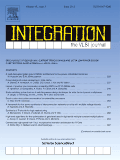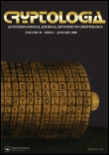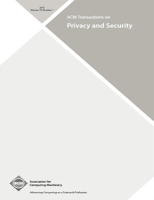
IACR Transactions on Symmetric Cryptology
Scope & Guideline
Advancing the Frontiers of Symmetric Cryptology
Introduction
Aims and Scopes
- Cryptanalysis of Cryptographic Primitives:
A core focus on developing and refining methods for analyzing the security of various encryption schemes, including block ciphers, stream ciphers, and hash functions. - Design and Implementation of Cryptographic Algorithms:
Research dedicated to the design principles and practical implementations of symmetric cryptographic algorithms that ensure both security and efficiency. - Quantum Resistance and Security Analysis:
Exploration of the implications of quantum computing on symmetric cryptography, including the development of new algorithms and techniques that can withstand potential quantum attacks. - Theoretical Frameworks for Cryptographic Security:
Establishing and refining theoretical models and frameworks to assess the security of cryptographic constructions, including leakage resilience and robustness against specific attack vectors. - Innovative Cryptographic Techniques:
Research into novel techniques and methodologies, such as algebraic attacks, differential and linear cryptanalysis, and advanced computational models to enhance cryptographic security.
Trending and Emerging
- Quantum Cryptography and Security:
An increasing number of papers focus on the implications of quantum computing for symmetric cryptography, exploring new algorithms and security frameworks designed to be quantum-resistant. - Advanced Cryptanalysis Methods:
Research is trending towards the development of complex cryptanalysis techniques, such as algebraic attacks and cube attacks, which leverage modern computational techniques to provide more effective security assessments. - Leakage Resilience and Side-Channel Attacks:
There is a growing emphasis on the resilience of cryptographic algorithms against side-channel attacks and information leakage, leading to innovative designs that incorporate leakage-resilient principles. - Tweakable and Deterministic Encryption Schemes:
Emerging research is increasingly focused on tweakable block ciphers and deterministic encryption mechanisms, aiming to enhance the security and functionality of symmetric encryption in practical applications. - Integration of Machine Learning in Cryptanalysis:
There is a notable increase in studies exploring the application of machine learning techniques to cryptanalysis, aiming to automate and improve the efficiency of finding vulnerabilities in cryptographic primitives.
Declining or Waning
- Basic Block Cipher Designs:
Research on traditional block cipher designs, such as the AES, has seen a decline as more emphasis shifts towards innovative and advanced constructions that address emerging security challenges. - Simple Cryptanalysis Techniques:
Basic or straightforward cryptanalysis methods are becoming less prevalent, with a preference for more sophisticated and computationally intensive techniques that provide deeper insights into cryptographic security. - Low-Complexity Implementations:
There is a noticeable decrease in research focused solely on low-complexity implementations of cryptographic schemes, as the field moves towards optimizing for security against sophisticated attacks rather than just efficiency.
Similar Journals

INTEGRATION-THE VLSI JOURNAL
Pioneering Insights in Very Large Scale IntegrationIntegration - The VLSI Journal, published by Elsevier, stands as a significant contributor to the fields of Electrical and Electronic Engineering, Hardware and Architecture, and Software. With its ISSN 0167-9260 and E-ISSN 1872-7522, this journal caters to a global audience interested in cutting-edge research and advancements in Very Large Scale Integration (VLSI) technologies and methodologies. As of 2023, the journal is classified in the Q3 category in its respective fields, demonstrating its commitment to quality and relevance in engineering. Researchers, practitioners, and students can benefit from its rigorous peer-review process, which ensures the publication of high-impact studies and innovative findings within the engineering landscape. Boasting a converged history from 1983 to 2025, Integration - The VLSI Journal continues to foster scholarly exchange and collaboration, making it an essential resource for anyone aiming to stay at the forefront of VLSI research.

Journal of the British Blockchain Association
Connecting ideas and insights in blockchain advancement.Journal of the British Blockchain Association, published by the British Blockchain Association, emerges as a dedicated platform for innovative research in the rapidly evolving field of blockchain technology. With an E-ISSN of 2516-3957, this open access journal has been committed to disseminating high-quality, peer-reviewed articles since 2018. Covering a wide range of topics from cryptographic security to decentralized applications, it serves as an essential resource for researchers, professionals, and students keen on exploring the implications of blockchain across various sectors. Although the journal’s H-index and Scopus rankings are yet to be established, its commitment to open access ensures that groundbreaking research is accessible to a global audience. By fostering collaboration and dialogue within the blockchain community, the journal plays a vital role in advancing knowledge and innovation in this pioneering field.

Journal of Computer Security
Empowering innovation in digital safety and security.Welcome to the Journal of Computer Security, a premier publication dedicated to advancing the field of cybersecurity and digital safety. Published by IOS PRESS, this esteemed journal has been at the forefront of research since its inception, with a rich history spanning from 1992 to 2024. Based in the Netherlands, the journal aims to provide a reputable platform for researchers and professionals to disseminate innovative findings in various subfields, including computer networks, hardware architecture, and software engineering. With its current Q3 ranking across multiple categories and a focus on safety, risk, reliability, and quality, the journal plays a critical role in shaping contemporary discourse and fostering collaboration within the cybersecurity community. Though it is not an open-access journal, the Journal of Computer Security remains a vital resource for academics and practitioners alike, offering access to significant advancements and methodologies that guide the evolution of security practices worldwide. Engage with us and contribute to this dynamic field of study!

JOURNAL OF CRYPTOLOGY
Advancing Knowledge in Cryptology and CybersecurityJOURNAL OF CRYPTOLOGY, published by SPRINGER, stands at the forefront of research in the domains of applied mathematics, computer science applications, and software security. With a history of significant contributions since its inception in 1988, this esteemed journal encompasses a broad range of topics in cryptology, including but not limited to encryption, security protocols, and information security systems. Holding a prestigious Q1 classification in multiple fields, it ranks #45 out of 635 in Applied Mathematics and has esteemed positions in Computer Science categories, reflecting its influence and recognition in the academic community, as evidenced by its high percentiles. As a vital resource for researchers, professionals, and students, the JOURNAL OF CRYPTOLOGY not only aims to disseminate innovative findings and methodologies but also fosters an engaging discourse within the cryptology and cybersecurity realms. Notably, it offers access through traditional subscription models, ensuring that readers benefit from a rigorous selection of high-impact research articles. Explore groundbreaking advancements and contribute to the ongoing dialogue in this pivotal field through your engagement with our journal.

ACM Transactions on Quantum Computing
Advancing the Frontiers of Quantum InnovationACM Transactions on Quantum Computing (ISSN: 2643-6809, E-ISSN: 2643-6817), published by the Association for Computing Machinery, is a leading journal dedicated to advancing the field of quantum computing. With a focus on innovative research and applications, this journal serves as a prime venue for disseminating significant findings in quantum algorithms, quantum information theory, and quantum hardware. As a reflection of its quality and impact, the journal is highly ranked in several categories, including #8 in Physics and Astronomy and #18 in Computer Science according to Scopus metrics. The journal's scope encompasses groundbreaking research from 2020 to 2024, making it an essential resource for researchers, professionals, and students aiming to stay at the forefront of quantum computing advancements. Although it follows a traditional publishing model without an Open Access option, contributors can be assured of wide visibility and recognition in this rapidly evolving field. Explore cutting-edge topics and contribute to the ongoing discourse in quantum computing with ACM Transactions on Quantum Computing.

International Journal of Electronic Security and Digital Forensics
Fostering collaboration for cutting-edge cybersecurity insights.The International Journal of Electronic Security and Digital Forensics, published by INDERSCIENCE ENTERPRISES LTD, is a leading platform for disseminating scholarly research in the realms of cybersecurity, digital forensics, and electronic security. Established with the objective of bridging the gap between theoretical advancements and practical applications, the journal spans critical areas such as network security, legal implications of digital forensics, and reliability in safety measures. With its ISSN 1751-911X and E-ISSN 1751-9128, the journal aims to provide valuable insights into emerging technologies and methodologies while maintaining high academic standards, as reflected in its diverse quartile rankings across multiple categories in 2023. Operating from the United Kingdom and catering to a global audience, the journal is committed to fostering innovative research that contributes to safer digital environments. Researchers, professionals, and students will find a wealth of information and opportunities for collaboration in this specialized field, making International Journal of Electronic Security and Digital Forensics an essential resource for advancing knowledge and practice.

CRYPTOLOGIA
Illuminating the Path to Information IntegrityCRYPTOLOGIA, published by Taylor & Francis Inc, is a pivotal journal dedicated to the field of cryptography and its applications. With an ISSN of 0161-1194 and an E-ISSN of 1558-1586, this journal has been a significant platform since its inception in 1977, promoting rigorous peer-reviewed research for scholars and practitioners alike. Although the journal's coverage was discontinued in Scopus after 2018, its legacy continues through a devoted readership, and it remains influential in the domains of Computer Science and Applied Mathematics, as indicating by its Scopus rankings. CRYPTOLOGIA presents a crucial repository of knowledge for those engaged in the evolving challenges of secure communication and information integrity. Researchers, professionals, and students interested in cryptographic protocols and theory can find invaluable insights and advancements within its pages, all while benefiting from the quality assurance of a reputable publisher.

DESIGNS CODES AND CRYPTOGRAPHY
Advancing Knowledge in Codes and Secure CommunicationDesigns, Codes and Cryptography is a renowned peer-reviewed journal published by Springer, dedicated to the interdisciplinary fields of applied mathematics, computer science, and discrete mathematics. With an exceptional impact factor, this journal is recognized for its high-quality research contributions and currently holds a prestigious Q1 ranking in multiple categories, including Applied Mathematics and Theoretical Computer Science, as of 2023. Featuring an extensive range of articles from 1991 to 2024, the journal serves as a pivotal platform for professionals, researchers, and students alike, focusing on innovative developments in coding theory, cryptography, and their practical applications in computing and secure communication. The journal's scope encompasses theoretical foundations, as well as algorithmic and applied aspects, making it an essential resource for advancing knowledge in the rapidly evolving fields of computer science and mathematics.

ACM Transactions on Privacy and Security
Fostering Collaboration for a Secure Computing Environment.ACM Transactions on Privacy and Security, published by the Association for Computing Machinery, is a prestigious journal dedicated to the field of computer science, with a particular focus on privacy and security in modern computing environments. Since its inception in 2016, this journal has become a vital resource for researchers, professionals, and students alike, addressing the increasing concerns surrounding data protection and risk management. With an impressive impact factor and recognition as a Q1 journal in both Computer Science (Miscellaneous) and Safety, Risk, Reliability and Quality, it ranks among the top publications in its field, positioned at the 73rd percentile in General Computer Science and the 71st percentile in Engineering. The journal’s Open Access options enhance accessibility to cutting-edge research, fostering collaboration and innovation in the rapidly evolving landscape of privacy and security. Readers can expect high-quality peer-reviewed articles that contribute significantly to both theoretical and practical advancements in technology and data security.

International Journal of Computer Mathematics- Computer Systems Theory
Innovating Theories in Computer Systems and MathematicsInternational Journal of Computer Mathematics - Computer Systems Theory, published by Taylor & Francis Ltd, is a vital resource in the fields of computational mathematics and computer systems theory. With an ISSN of 2379-9927 and E-ISSN 2379-9935, this journal has established a prominent presence in academia since its inception in 2016. It is categorized in the Q3 quartile for both Computational Mathematics and Computational Theory in 2023, reflecting its impact and contribution to the scholarly discourse within these domains. The journal’s Scopus rankings further emphasize its academic relevance, placing it in the 38th and 33rd percentiles in their respective categories. International Journal of Computer Mathematics aims to disseminate innovative research findings, methodologies, and theoretical advancements, making it an essential publication for researchers, professionals, and students looking to deepen their understanding of computational methods and applications. Although it currently does not offer open access, the journal continues to provide insightful contributions to the scientific community, fostering the evolution of computational sciences.